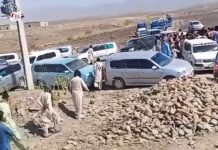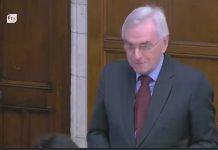A Hindu temple was laid to ruins by a mob of religious extremists in Karak district of Khyber Pakhtunkhwa on Wednesday as the police and the local administration silently watched the spectacle, and did not intervene to thwart the vandalism.
According to the details, the Hindu community in Karak had obtained permission from the authorities to extend the temple. But an extremist mob, led by the local clerics, demolished the temple and lit it on fire on Wednesday.
In Karak, the issue of Hindu temple has been going on since 1997, and was constructed after the ruling of the Supreme Court of Pakistan. A radical Muslim cleric pronounced in an address on Wednesday that temple and all the buildings associated with it shall be demolished. This then agitated the people who then destroyed and subsequently torched the temple.
The viral videos of the episode on social media show a large crowd gathered in the temple with pickaxes, hoes and large logs, chanting ‘Allah-o-Akbar (Allah is the greatest) and various anti-Hindu cries. A group of people can be seen destroying the roof as dust and smoke billows from the fallen debris and fire.
The police and the local administration reportedly remained silent and did not attempt to repel the mob as it laid the entire temple to ruins.
Today’s incident in Karak is not an isolated event; the Hindu community in Pakistan have seen their temples being vandalized numerous times. In the wake of the Babari Mosque Demolition in India, Pakistani Hindus had to face riots. Five temples were destroyed in Karachi, and 25 temples throughout Sindh. Hindu shop owners were attacked in Sukkur and Hindu homes were targeted in various cities of Pakistan, including in Quetta.
Hindus in Pakistan are treated as second-class citizens and many have continued to flee to India to escape the religious persecution, and the number of Hindu families relocating annually has only increased. According to the Human Rights Watch, 1000 Hindu families fled to India in 2013. A year later, in 2014, a Hindu parliamentarian revealed before the National Assembly of Pakistan that 5000 Hindu families escape Pakistan every year.
The Hindu families that manage to flee Pakistan allege that they faced extremism and discrimination in the form of sexual harassment, lynching and forced conversions. They say that their children were forced to read the Quran in schools and their religious practices were mocked.
The anti-Hindu sentiment has grown in sync with the rise of radical Islamic groups like Tehreek-e-Taliban Pakistan, which has also mounted attacks on other religious minorities like Ahmadis and Hazaras.
The Pakistani government announced in April 2019 that it will rebuild the 400+ temples which were either demolished by extremist mobs or converted for other uses. The process was to begin with the restoration of two historical temples in Sialkot and Peshawar. But according to a recent government survey, only 20 out of the 400 temples were operational in Pakistan – 11 in Sindh, 4 in Punjab, 3 in Balochistan and 2 in KPK.
Another issue confronting the Hindu community of Pakistan is the forced conversion and subsequent marriage of underage Hindu girls to middle-aged Muslim men. Forced conversions have been rampant especially in Sindh where radical Muslim clerics have moiled to perpetuate the practice.
Twice the Sindh government attempted to outlaw forced conversions and forced marriages of underage Hindu girls by placing an age limit of 18 years upon conversions. The Sindh Assembly unanimously passed the bill in 2016, but some religious parties objected the age limit and threatened to besiege the assembly if the bill received the approval of the Sindh governor. The governor then refused to sign the bill, and practice continued to fester.
The Sindh government once again introduced a revised version of the bill in 2019, but the religious parties once again protested. Pir Mian Abdul Khaliq (alias Mia Mithu), a religious leader and central character of many incidents of forced conversions, staged a sit-in protest against the bill. Mithu and his group deny the accusations of forced conversions and claim that the underage Hindu girls fall in love with Muslim men and convert willingly.
Radical religious groups enjoy a significant clout in Pakistan, and their members have been frequently involved in vigilante lynchings and forced conversions.
International rights groups claim the entire legal system of Pakistan discriminates against the minorities. Force conversions are one case: once the women convert – either willingly or under duress – there is no going back, as apostasy would inevitably translate into a death sentence. Women in many cases have been threatened not to meet with their ‘kafir’ (infidel) families, which further impedes them from acquiring justice.





























